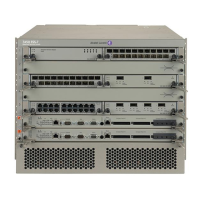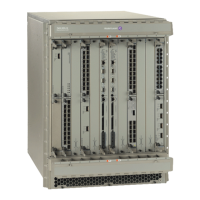Network Synchronization
270 Basic System Configuration Guide
In addition, performance is also improved by the removal of any PDV caused by internal
queuing within the boundary clock or slave clock. This is accomplished with hardware that
is capable of detecting and time stamping the IEEE 1588v2 packets at the Ethernet interface.
This capability is referred to as port-based time stamping.
Port-Based Timestamping of PTP Messages
For optimal performance, the 1588 packets should be time-stamped at the ingress and egress.
This avoids any possible PDV that might be introduced between the port and the CPM. The
ability to timestamp in the interface hardware is provided on a subset of the IMM and MDA
assemblies of the routers. Refer to the release notes for the complete list.
In order for this to operate, the CPM, IOM, IMM, and MDAs must be running firmware that
supports this capability. The CPM firmware upgrade occurs automatically when the CPM
card software is updated. Since upgrading of IOM, IMM, and MDA firmware is service
impacting, this upgrade is not performed automatically on a soft reset of the MDA. The IOM/
IMM firmware is upgraded when the IOM/IMM card is hard reset. The MDA firmware is
programmed during system initialization, when the MDA is inserted, or when the MDA is
hard reset via a clear mda or clear card command. However, when an MDA is soft reset via
either a clear card soft command or during a major ISSU, the MDA firmware is not updated.
PTP Capabilities
For each PTP message type to be exchanged between the router and an external 1588 clock,
a Unicast Session must be established using the Unicast Negotiation procedures. The router
allows configuration of the message rate to be requested from external 1588 clocks. The
router also supports a range of message rates that it will grant to requests received from the
external 1588 clocks.
Table 36 describes the ranges for both the rates that the router can request and grant.
Table 36: Message Rates Ranges and Defaults
Message Type Rates Requested by the 7X50 Rates Granted by the 7X50
Min Max Min Max
Announce 1 packet every 16
seconds
8 packets/second packet every 16
seconds
8 packets/second
Sync 1 packet/second 64 packet/second 1 packet/second 128 packet/second
Delay_Resp 1 packet/second 64 packets/second 1 packet/second 128 packets/second
